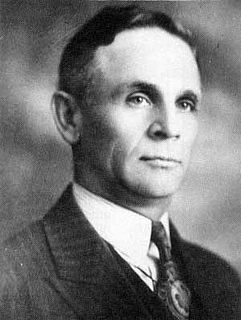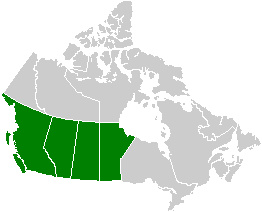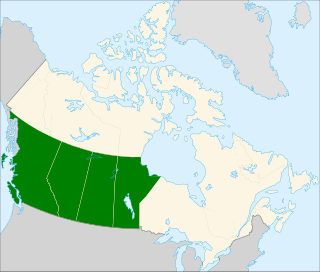
The Reform Party of Canada was a right-wing populist and conservative federal political party in Canada that existed from 1987 to 2000. Reform was founded as a Western Canada-based protest movement and eventually became a populist conservative party, with strong social conservative elements. It was initially motivated by the perceived need for democratic reforms and by profound Western Canadian discontent with the Progressive Conservative (PC) federal government of Brian Mulroney.
The Progressive Party of Canada was a federal-level political party in Canada in the 1920s until 1930. It was linked with the provincial United Farmers parties in several provinces, and it spawned the Progressive Party of Saskatchewan, and the Progressive Party of Manitoba, which formed the government of that province. The Progressive Party was part of the farmers' political movement that included federal and provincial Progressive and United Farmers' parties.

The Communist Party of Canada is a communist political party in Canada founded in 1921 under conditions of illegality. Although it is now a political party without any parliamentary representation, the party's candidates have been elected to the Parliament of Canada, the Ontario legislature, the Manitoba legislature, and various municipal governments across the country. The party has also contributed significantly to trade union organizing and labour history in Canada, peace and anti-war activism, and many other social movements.

The Christian Heritage Party of Canada, also referred to as CHP Canada, is a minor social and fiscal conservative federal political party in Canada; it was founded in 1987. CHP advocates for Canada to be governed according to Christian principles. The party's stated principle is that "the purpose of civil government is to ensure security, freedom, and justice for all its citizens from conception till natural death, by upholding just laws". CHP states that, if the party forms government, it hopes to "apply proven Judeo-Christian principles of justice and compassion to Canada's contemporary public policy needs".
The Western Canada Concept was a Western Canadian federal political party founded in 1980 to promote the separation of the provinces of Manitoba, Saskatchewan, Alberta and British Columbia, and the Yukon and Northwest Territories from Canada in order to create a new nation.

John Bracken was an agronomist, the 11th and longest-serving Premier of Manitoba (1922–1943) and leader of the Progressive Conservative Party of Canada (1942–1948).
The Western Canada Concept Party of BC is a provincial political party in British Columbia, Canada. It was the British Columbia branch of the Western Canada Concept, a political party that operated at the federal level, advocating the separation of the four western provinces of Canada and the formation of a new country comprising British Columbia, Alberta, Saskatchewan and Manitoba.
The Western Canada Concept Party of Saskatchewan was a provincial political party that was the Saskatchewan, Canada branch of the Western Canada Concept, a federal political party that advocated the separation of the four western provinces of Canada to form a new country.
The Western Independence Party of Saskatchewan is a registered provincial political party in Saskatchewan, Canada. It advocates for the independence of Saskatchewan and libertarian ideals. The party is led by Neil Fenske and is not affiliated with any federal party.

The Western Independence Party (WIP) was a Canadian political party that advocated the separation of Western Canada from Canada to form a new country from the provinces of British Columbia, Alberta, Saskatchewan and Manitoba, and the Yukon and Northwest Territories.

There have been various movements within Canada for secession.
The Western Canada Concept was a Canadian political party. It was founded in 1980, and promoted the separation from Canada of all provinces and territories west of Ontario.
The Western Independence Party of Manitoba was a political party in the Province of Manitoba, Canada. It was formed in 1987 by Fred Cameron, formerly the leader of the province's Western Canada Concept. It is unclear if the Manitoba WIP was simply a renamed WCC or an entirely new organization. The Manitoba WCC seems to have disappeared soon after the WIP's founding.
The Western Block Party (WBP) was a federal political party in Canada founded in 2005 by Doug Christie. The party was registered on December 29, 2005, and deregistered on January 31, 2014.

Alberta separatism comprises a series of 20th and 21st century movements advocating the secession of the province of Alberta from Canada, either by forming an independent nation or by creating a new union with one or more of Canada's western provinces. The main issues driving separatist sentiment have focused on power disparity relative to Ottawa and other provinces, and Canadian fiscal policy, especially as it pertains to the energy industry.

In Canadian politics, Western alienation is the notion that the Western provinces – British Columbia, Alberta, Saskatchewan and Manitoba – have been alienated, and in extreme cases excluded, from mainstream Canadian political affairs in favour of the central provinces of Ontario and Quebec. Western alienation claims that these latter two are politically represented, and economically favoured, more significantly than the former, which has given rise to the sentiment of alienation among many western Canadians.
This article provides a timeline of elections in Canada, including all the provincial, territorial and federal elections. The information starts from when each province was formed or entered the Confederation, and continues through to the present day.
The New Democratic Party is a social democratic federal political party in Canada. The party was founded in 1961 by the Co-operative Commonwealth Federation (CCF) and the Canadian Labour Congress (CLC). On the Canadian political spectrum, the party sits to the left of the Liberal Party. The federal and provincial level NDPs are more integrated than other political parties in Canada, and have shared membership.

Western Canada, also referred to as the Western provinces and more commonly known as the West, is a region of Canada that includes the four provinces of Alberta, British Columbia, Manitoba, and Saskatchewan. British Columbia is culturally, economically, geographically, and politically distinct from the other parts of Western Canada and is often referred to as the "west coast" or "Pacific Canada", while Alberta, Saskatchewan, and Manitoba sometimes form a subset together as the Prairie Provinces.
The Maverick Party, formerly known as Wexit Canada, is a Canadian federal political party. It advocates for the secession of Western Canada, which includes British Columbia, Alberta, Saskatchewan, Manitoba and the three Territories. The former name was a play on Brexit, the withdrawal of the United Kingdom from the European Union. The party has its roots in Alberta separatism.








